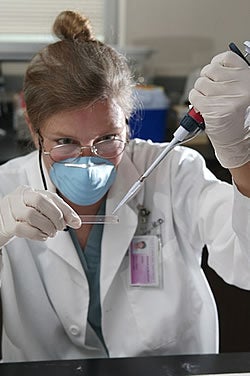Grant aids research into kidney cancer treatment
GREENVILLE, N.C. — Research by a pair of East Carolina University researchers that could hold a key to fighting kidney cancer has gotten a boost from a $40,000 grant.
The Triad chapter of Golfers Against Cancer has awarded the grant to Drs. Anne Kellogg and Fred Bertrand to help further their research into a substance called a monoclonal antibody that could be used for the treatment of kidney cancer.

Dr. Anne Kellogg
Kellogg, a physician and associate professor of pathology and laboratory medicine at the Brody School of Medicine at ECU, has developed a similar antibody for ovarian cancer that is undergoing trials with a pharmaceutical company.
Bertrand is an assistant professor of internal medicine/hematology oncology at the medical school.
Dr. Karlene Hewan-Lowe, an associate professor of pathology and an expert in kidney pathology, is assisting Kellogg and Bertrand in the evaluation of this antibody in human tumor specimens.
Monoclonal antibodies are proteins, produced from a single parent cell, that bind to a specific substance. They can be used to detect or purify that substance and are widely used in hospital and pathology laboratories as components of diagnostic tests.
Monoclonal antibodies gained attention as a possible way to treat cancer in the 1980s. In the 1990s, scientists refined techniques to expand their usefulness as therapeutics by making subtle changes to the antibodies so the human body would not reject them as foreign tissue. One of the best-known monoclonal antibodies is trastuzumab, sold under the brand name Herceptin and used to treat breast cancer.
In cancer therapy, an antibody can be used in several different ways. Some antibodies have the ability to directly kill the cancer cells while other antibodies work best when they are used as targeting vehicles carrying a cell-killing payload (such as drug or radioactive isotope) to the cancer cells.
Kellogg began working with monoclonal antibodies in the early 1990s, looking for ones pathologists could use to diagnose cancer. A few years later, she turned her attention to identifying an antibody that not only could recognize tumors but also be useful in treating them.
Kellogg added that the treatment could have benefits even if it falls short of curing cancer, such as making cancer a chronic rather than terminal disease.
Golfers Against Cancer, founded in 1997, has raised more than $18 million to fund cancer research. The Triad chapter has raised and given more than $1 million, all of which has been donated to cancer centers in North Carolina.
The ECU Medical & Health Sciences Foundation helped arrange the grant funding from Golfers Against Cancer.